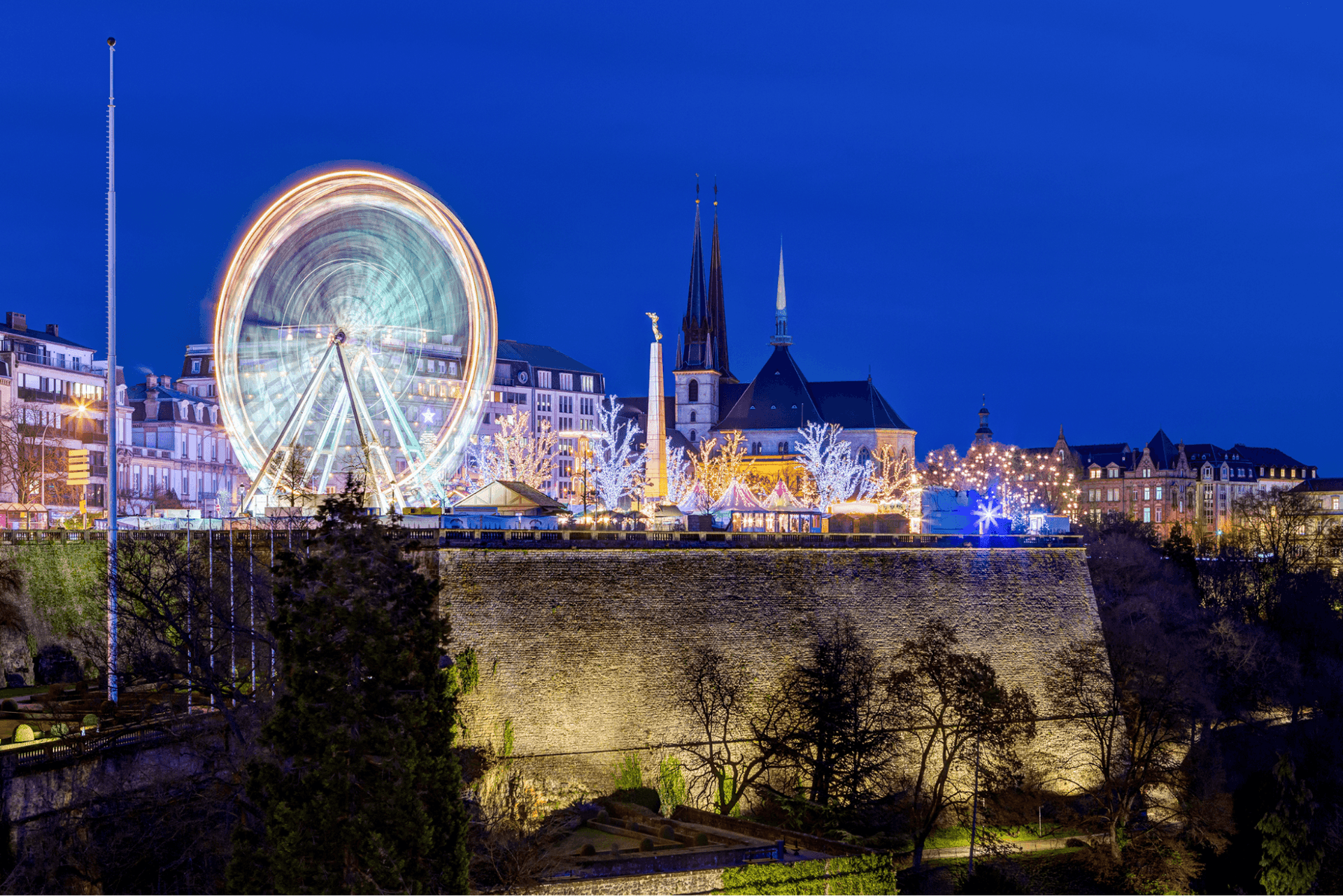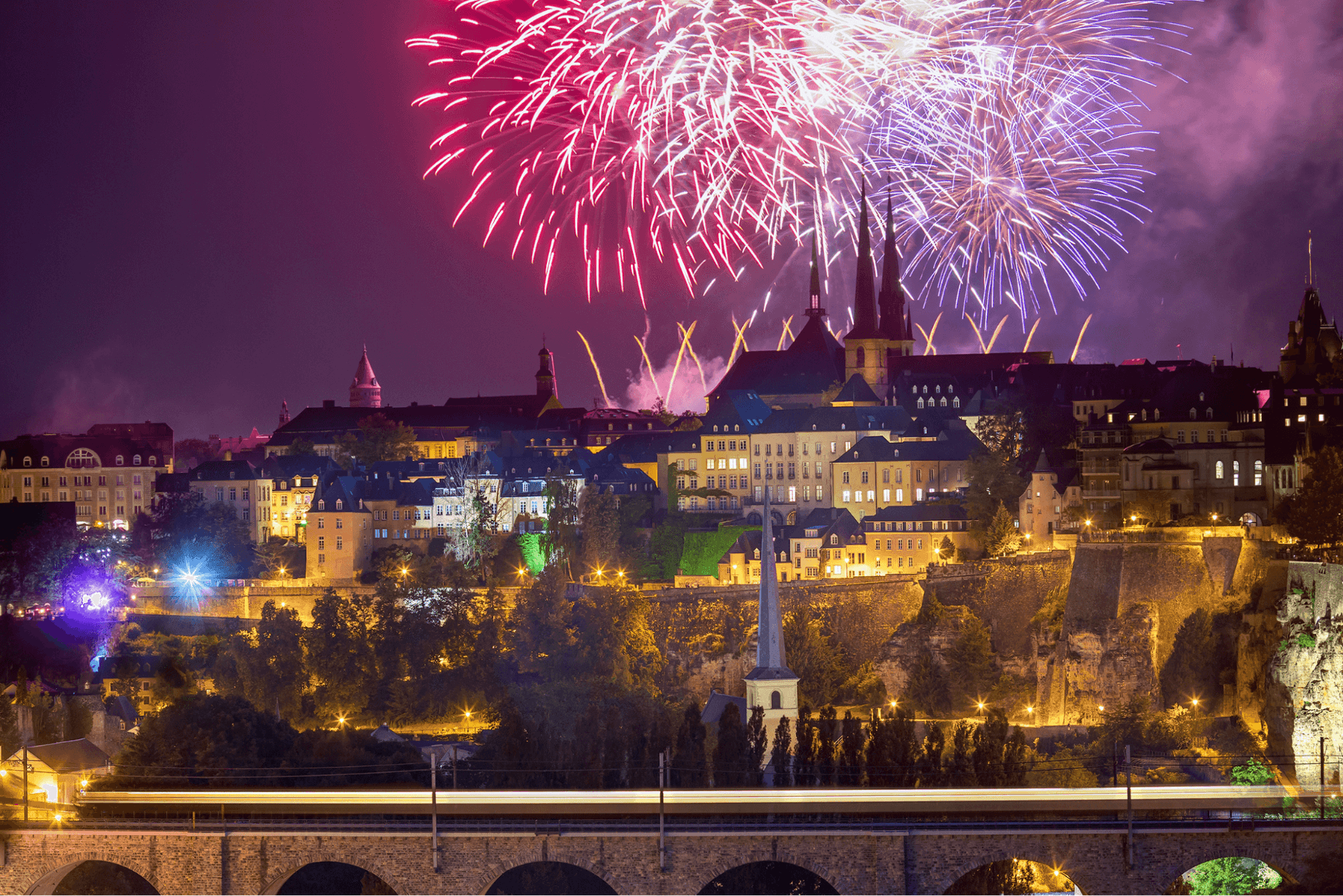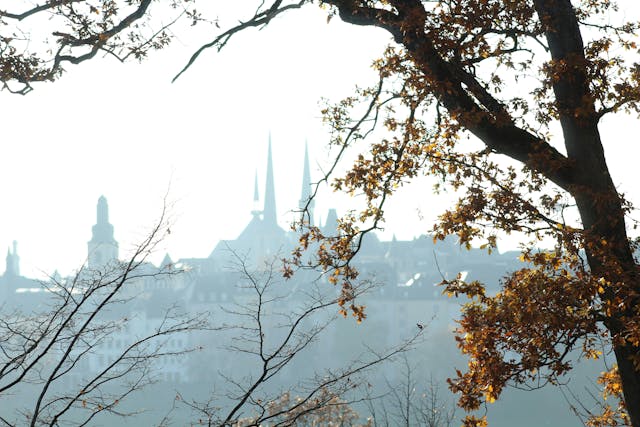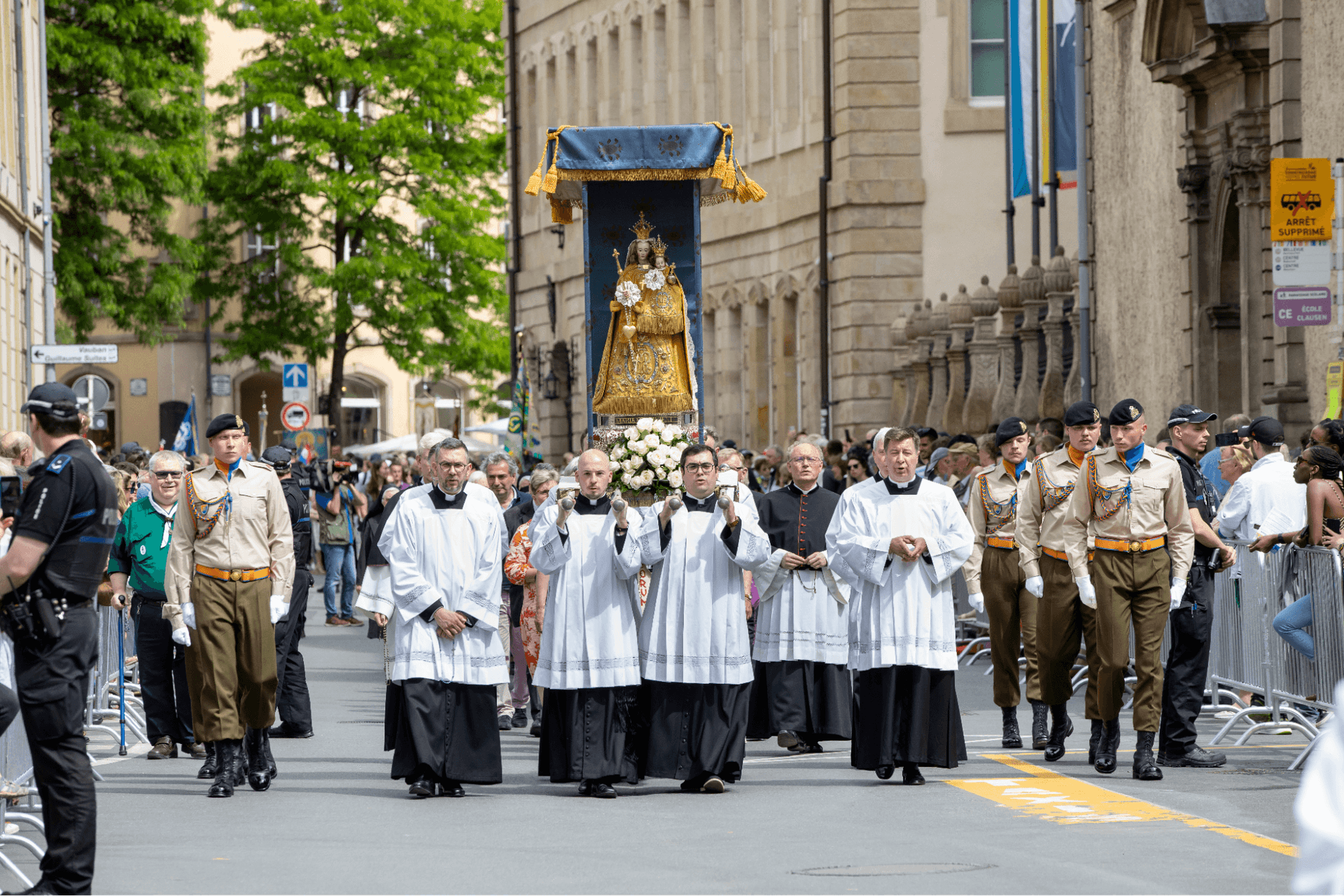
Luxembourg national holidays in 2025: bank holidays and traditions
In this article we will have a look at the official and national holidays of the Grand Duchy of Luxembourg.
Luxembourg is a country in Western Europe with a small population (620,000+), but a rich history, culture, and traditions, which are reflected in celebrations and public holidays. In this article, we will look at the different public holidays in Luxembourg and how they impact everyday life.
Overview of public holidays celebrated in Luxembourg in 2025
There is a total of 11 public holidays in Luxembourg. Among them, 8 have a fixed date, and 3 are celebrated according to the lunar calendar, meaning without fixed dates, because their reference point is a date of Easter.
Always celebrated on the same day
- January 1 — New Year,
- May 1 — Labor Day,
- May 9 — Europe Day,
- June 23 — National Day of Luxembourg,
- August 15 — Day of the Assumption of the Blessed Virgin Mary,
- November 1 — All Saints' Day,
- December 25 — Christmas,
- December 26 — St. Stephen's Day, or Boxing Day.
Public holidays with a variable date include Easter Monday, Ascension Day, and Trinity Monday. Luxembourg national holidays are often celebrated with festivities, parades, and cultural events.
Christmas
Luxembourg's main official winter public holiday is Christmas. The preparations for it begin well in advance, usually in the middle of November, 6-7 weeks before the actual date — December 25.
There are numerous musical performances throughout the Christmas season, including orchestras that entertain guests with holiday music.
Christmas markets and fairs open, both inside and outside the capital, including themed fairs — medieval, vegan, and children's fairs. A Christmas circus, carousels, and a magic railway train for children are also open during the holiday season.

The municipal conservatory, theatres, and cinemas in the capital also traditionally prepare extensive programs for the Christmas season. And thousands of Christmas lights are lit all over Luxembourg.
During the Christmas season, public transport timetables and the opening hours of some stores are also altered so that visitors and residents can shop in a festive atmosphere and get ready for St. Stephen's Day.
Read article
St. Stephen's Day
A public holiday in Luxembourg, which is celebrated on the day after Christmas, December 26. Similarly, December 25, is an official holiday.
In the Christian faith, St. Stephen is one of the seven helpers of the Apostle Peter, who helped take care of widows, orphans, and the poor. In other countries, it is called Boxing Day. This is the day in Luxembourg when people give each other gifts.
New Year
In Luxembourg, New Year's Eve is celebrated on the night of December 31 to January 1, which is considered a public holiday and an official day off. Traditionally, it is celebrated in the family circle with a festive dinner. However, many people go out on the streets of the city and visit local restaurants and cafes.
Civic tradition
There are no special national traditions related to the celebration of the New Year in the Grand Duchy: Christmas is considered to be the favorite and most important holiday in Catholic Luxembourg.
Residents usually enjoy fireworks around midnight in places where municipalities have lifted the ban on pyrotechnics. Normally it is allowed in special places and for a limited time – strictly for 10-15 minutes, after which you have to clean up or you will get a fine.
Labor Day
The first day of May is a Luxembourg national day. There are usually some local demonstrations in the main streets and squares, involving representatives of various political parties or trade unions.

The biggest demonstrations usually take place in neighbouring Germany and France.
Europe Day
Europe Day was first celebrated in Luxembourg on May 9, 2019. Now it is an official public holiday and a bank day.
In the past year for Europe Day, the Luxembourg City Tourist Office has prepared thematic tours: the "Schuman" route and one more – «Luxembourg, capitale européenne: un engagement continuo». The first focuses on the role of Robert Schuman. The second is dedicated to the role of Luxembourg as one of the three official sites of the EU.
Since this national day is relatively new in Luxembourg, it is still too early to talk about any developed traditions.
It is celebrated on May 9 because Robert Schuman, a Luxembourg citizen and French politician, proposed the creation of the European Coal and Steel Community on May 9, 1950, which was important for the further economic integration in Western Europe and the appearance of the EU.
Read article
National Day of Luxembourg
One of the most important Luxembourg national holidays. This day marks the birthday of the Grand Duke, although no Duke was born on June 23. Luxembourg National Day is designed to bring people together to celebrate independence and honour Luxembourg's cultural heritage.

Traditionally, the holiday begins with a military parade in the morning, followed by a service in a cathedral. In the evening there are fireworks all around the country, with concerts and other cultural events.
Get to know the culture of the Grand Duchy with our dedicated guide

Assumption Day
The tradition of honouring the Virgin Mary is very strong in Catholic countries in general and in Luxembourg in particular. It is celebrated on August 15 every year.
Religious celebration
As for the veneration of the Remembrance Day of the Virgin Mary, church services are usually held on that day. Read more about the traditions and origins of this celebration in our dedicated article.
Apart from Assumption Day, which is a national holiday and an official public day, Luxembourg holds the Oktave, one of the most important religious events in the Grand Duchy.
Pilgrims from neighbouring regions and from all over the country come to Luxembourg, the capital of the Grand Duchy, to pay their respects to the Mother of God and to pay their respects to her statue in the Cathedral of Our Lady of Luxembourg (Cathédrale Notre-Dame de Luxembourg). It is believed that praying to the Virgin Mary stopped the plague in 1666.

On the last day of the Oktave, a grand procession passes through the streets of the capital with a sculpture of the Holy Mother of God at its head. The family of the Grand Duke and members of the government participate in the procession. Oktave is not considered an official bank holiday, but it is a celebration.
The Oktave begins on the third Saturday after Easter and ends on the fifth Sunday after. In 2025, these dates fall between 10 May and 25 May.
All Saints' Day
This holiday is celebrated on November 1 and is closely related to the memorial day for the dead, which follows on November 2. November 1 is an official bank holiday and a day off. Though this does not apply to November 2.
On this occasion, families uphold age-old customs to pay homage to their departed beloved. The observance usually commences with participation in a distinctive mass, during which prayers and reflections are dedicated to those who have passed away.
Autumn is almost gone
This holiday has its roots in the origins of Christianity. Read more about these fall-themed traditions in our dedicated story.
Easter Monday
This holiday is celebrated in Luxembourg every year and with great publicity. In the capital and in the small town of Nospelt, the Éimaischen a colorful festival is traditionally held on this day. In 2025, Easter Monday will fall on April 21.

Easter Monday in the Duchy was a festival of the... potters!
Small whistling birds made of clay, called Péckvillercher, are sold in the streets of the Old Town. Traditionally, various folklore groups perform songs, dances and music at the festival, and a number of artisan stalls are set up.
Ascension Day
Ascension Day is a national holiday celebrated on the 40th day after Easter. It is an official holiday in Luxembourg. Traditionally, a service is held in the cathedral on this day.
➤In 2025, Ascension Day will fall on May 29. Thus, two holidays will be on the same date: Ascension Day and Europe Day.
In such a situation, the Luxembourg Labor Code provides for a paid day off: “If one of the public holidays falls on a weekend, then any Luxembourg employee has the right to paid time off.” The same rule applies if a public holiday falls on a weekend.
Spiritual Day, or Trinity Monday
National holiday is celebrated on the Monday after the Trinity: people often have outdoor gatherings, picnics or barbecues in public parks or other outdoor venues.
And in 2025 it will fall on June 9.
Luxembourg's public holidays
There are many days throughout the year when children and adults alike get a day off from going to school and working. Be aware that this may also affect the timetable of public transport, the opening hours of shops and restaurants and the working hours of government offices.
| Holiday | French name | Date | Day of the week |
| Easter Monday * | Lundi de Pâques | 21 April | Monday |
| Labor Day | Fête du Travail | 1 May | Thursday |
| Europe Day | Journée de l'Europe | 9 May | Friday |
| Ascension Day * | Ascension | 9 May | Friday |
| Trinity Monday * | Lundi de Pentecôte | 9 June | Monday |
| National Day of Luxembourg | Fête nationale | 23 June | Monday |
| Assumption Day | Assomption | 15 August | Friday |
| All Saints' Day | Toussaint | 1 November | Saturday |
| Christmas | Noël | 25 December | Thursday |
| St. Stephen's Day | Saint-Etienne | 26 December | Friday |
| New Year Day | Nouvel An | 1 January | Wednesday |
*
The asterisks indicate the holidays with dates that are unique for each year since they depend on the date of Easter.
Working hours on bank holidays
Luxembourg's banks and financial institutions are completely closed during holidays. Banks provide limited services during public holidays — through online banking platforms or through ATMs. It is recommended to do all necessary transactions and payments on the day before the holidays.
The same applies to the operating hours of the majority of stores, museums, exhibitions, and other public institutions and public services. They are usually closed, with the exception of some hospitals, pharmacies, and restaurants. You should check the opening hours in advance.
National holidays associated with Luxembourg traditions
Alongside the public holidays, which determine the weekends of the calendar, religious and social holidays play an important role in Luxembourg. They are essential for understanding the traditions of the Grand Duchy.
Most of these events have flexible dates.
Candles Day
The tradition of celebrating Liichtmëssdag вn Luxembourg goes back to the saint Blaise of Sebaste. Although the holiday is not officially celebrated, it is beloved by the children of the Grand Duchy.

Every child who knocks on the door receives a small gift — candy, lollipops, or even a bit of change. The tradition is similar to the well-known "trick-or-treating" on Halloween. Another important part of the celebration is the preparation of pancakes.
Every year on February 2, they walk from door to door in the early evening with burning candles or lanterns (called Lichtebengelchen), sing a traditional song (Le'wer Hergottsblieschen) and ask for a reward.
Carnival in Luxembourg
One of the significant events of the Grand Duchy which precedes Lent.
A lot of activities, games and contests with prizes are invented for children during the carnival. The costumes are mostly handmade by the residents. There are special carnival treats — doughnuts Nonnefäscht and Verwurrelt.
In 2025, the holiday takes place from February 2 to March 5.
Buergbrennen
This fete is celebrated on the first Sunday after Carnival. Huge bonfires are lit all over the country to farewell winter. A huge cross made of wood is burned in the fire as a symbol of the banishment of winter. Every village has its own Buergbrennen.
It is a tradition that brings locals together when they gather altogether to watch the bonfires.
In 2025 it will take place over the weekend of March 8 and 9.
Bretzelsonndeg
Bretzel Day is celebrated around the middle of Lent, which is not a religious time of restriction in Luxembourg.
Traditionally, on this day a man offers his beloved a pretzel. If the feeling is mutual, he gets an egg from her for Easter; if not, he gets an empty basket.
In 2025, the day will be celebrated on March 30.
Easter
Easter Sunday is a holiday with no fixed date, which still determines a large number of formal and informal events in Luxembourg.
The traditional attributes of the holiday are the Easter bunny and Easter eggs. Not just chocolate ones: people also try to crack them with each other in a small game and exchange them at the end. The following day is Easter Monday, the public holiday in Luxembourg.
In 2025, Easter will be celebrated on April 20, on Sunday.
Trinity
The day of Trinity is celebrated on the 50th day after Easter.
Festive services are held in churches in the morning. Locals prepare festive foods at home and get ready for Trinity Monday and Trinity week.
In 2025, Holy Trinity Day will fall on June 9.
Primrose Day
is Celebrated on Trinity Monday in Vilce, this holiday called Gënzefest in Luxembourgish attracts a lot of people.
The main entertainment is the traditional parade, which welcomes the blossoming of the bramble and celebrates the habits of the old farming country.
In 2025 the celebration will take place on June 9.
Willibrord Day
On the Tuesday after Trinity, Echternach celebrates a feast in honor of St. Willibrord, the Patron Saint of Luxembourg, whose relics are preserved in the Basilica of the city.
According to tradition, participants gather on the square in front of the city abbey, dance to the beating of a huge bell from the 16th century, march through the streets of the city and go up to the Basilica to pay their respects to the saint. The celebration is also called the Echternach Dancing Procession.
In 2025, Willibrord Day falls on May 21.
Mother's Day
Mammendag is celebrated in Luxembourg on the second Sunday in June. Although the holiday does not have the status of a national holiday, it is very popular all over the country.
Traditionally, kids give their mothers gifts: schoolchildren make small souvenirs at school, and adults give bouquets of flowers, chocolates, and anything that would make their mothers happy.
In 2025, Mother's Day falls on June 8.
Schueberfouer
The largest annual fair in Luxembourg. It opens in the middle of August and lasts until mid-September. It is not really a holiday, but many locals perceive Schueberfouer as such.

Although the fair initially revolved around the eve of St. Bartholomew's Day on August 24th and spanned for eight days, the modern Schueberfouer now boasts a more flexible timetable.
Commencing in the final days of August and extending into the initial days of September, this event has evolved into a three-week-long attraction that we have thoroughly explained in our featured article.
In 2025, the planned dates for the fair are August 22 to September 10.
Grape Festival
It is celebrated in autumn. The most famous Drauwen- a Wäifest (Grape and Wine Festival) takes place every September and attracts thousands of people to one of the cities of the Moselle region.
Traditionally, the queen of grapes is chosen. The coronation of the wine queen, the music parade and the concerts take place in Grevenmacher for three days.
In 2025, Drauwen- a Wäifest is scheduled to take place from September 12 to 14.
Father's Day
It is celebrated on the first Sunday in October. Like Mother's Day, it does not have the status of a public holiday, but it is rather popular with local residents.
Kids celebrate their fathers and express their gratitude and love to them. But since the holiday is informal, no ceremonies are held.
In 2025, Father's Day will be celebrated on October 5.
Valentine's Day
Although Luxembourg has a non-state holiday called Bretzelsonndeg, Valentine's Day is popular with the youth of the Grand Duchy.
Young people use it as an extra reason to confess their feelings to each other, and exchange romantic valentines cards and gifts. It is traditionally common to give flowers and sweets to your loved ones.
The holiday is celebrated every year on February 14.
Halloween
Another non-state holiday popular in Luxembourg. Young people especially enjoy the holiday.
In Luxembourg, there are many themed parties for adults and children. Festive decorations such as candles, pumpkins, and gloomy decorations can be found all over the Grand Duchy. Read more about what to do on this spooky day in our article.
It is held every year on October 31.
Main celebrations in 2025 in Luxembourg
| Name | Date | Day of the week | Status |
| New Year Day | 1 January | Wednesday | Bank holiday |
| Liichtmëssdag (Candle Day) | 2 February | Sunday | Working day |
| Carnival in Luxembourg* | February 2-March 5 | — | Working day, except for Sat. and Sun. |
| St. Valentine's Day | 14 February | Friday | Working day |
| Buergbrennen* | March 8 and 9 | Saturday and Sunday | Weekend |
| Bretzelsonndeg (Bretzel Day)* | 30 March | Sunday | Weekend |
| Easter* | 20 April | Sunday | Weekend |
| Easter Monday* | 21 April | Monday | Bank holiday |
| Oktave* | 10 - 25 May | — | Working day, except for Sat. and Sun. |
| Labor Day | 1 May | Thursday | Bank holiday |
| Europe Day | 9 May | Friday | Bank holiday |
| Ascension Day* | 29-may | Thursday | Bank holiday |
| Trinity Monday* | 9 June | Monday | Bank holiday |
| Gënzefest (Primrose Day)* | 9 June | Monday | Bank holiday |
| Willibrord Day* | 21 May | Wednesday | Working day |
| Mother's Day | 8 June | Sunday | Weekend |
| National Luxembourg Day | 23 June | Monday | Bank holiday |
| Assumption Day | 15 August | Friday | Bank holiday |
| Schueberfouer | August 22 — September 10 | — | Working day, except for Sat. and Sun. |
| Grape Festival* | September 12 to 14 | Friday - Sunday | Working day, except for Sat. and Sun. |
| Father's Day | 5 October | Sunday | Weekend |
| Halloween | 31 October | Friday | Working day |
| All Saints' Day | 1 November | Saturday | Bank holiday |
| Christmas | 25 December | Thursday | Bank holiday |
| St. Stephen's Day | 26 December | Friday | Bank holiday |
*
The asterisks indicate the holidays with dates that are unique for each year since they depend on the date of Easter or are set individually by the Luxembourg government.
Frequently Asked Questions (FAQ)
Do people have to work on public holidays?
Do stores, beauty salons, and government offices work on holidays?
Source: www.luxembourg-city.com
We took photos from these sources: Jason Dent on Unsplash, luxembourg-city, L'essentiel / Vincent Lescaut, Unsplash